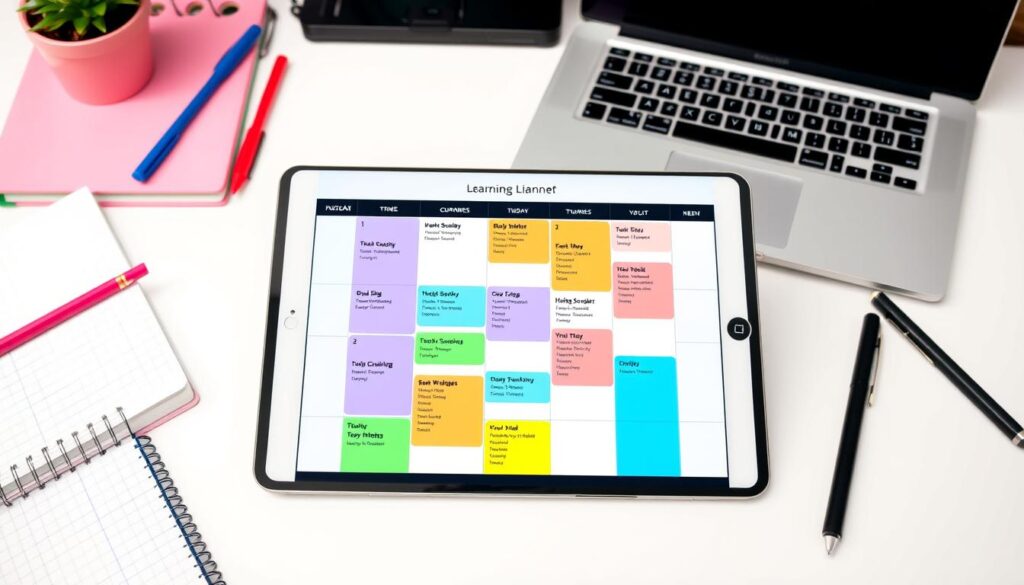The world has changed a lot, and so has how we learn. Now, we can get knowledge online easily. But, to do well in online classes, you need self-discipline and good time management. Mahatma Gandhi said, “The future depends on what you do today.” This is very true for online students who need to stay focused and productive.
Table of Contents
Understanding the Foundations of Self-Discipline in Digital Education
Mastering self-discipline is key for success in online learning. By exploring the psychology of self-control, we can find the main parts of academic self-discipline. We can also learn how to build mental strength for virtual studies.
The Psychology Behind Self-Control in Virtual Learning
Self-control is at the heart of self-discipline. It’s about controlling our thoughts, feelings, and actions. Studies show that those with strong self-control do better in school. They can avoid distractions, stay focused, and keep going even when it’s hard.
Core Components of Academic Self-Discipline
- Goal-setting and planning: Setting clear goals and making a plan to achieve them.
- Time management: Organizing your study time well to be more productive.
- Delayed gratification: Choosing long-term success over quick, tempting distractions.
- Emotional regulation: Staying calm and focused, even when faced with frustration or setbacks.
Building Mental Fortitude for Online Studies
Being mentally tough is essential for success in online learning. Embracing willpower proverbs, determination maxims, and perseverance aphorisms can help. They help you develop the mental strength needed to face challenges and keep going in your online education.
“The true measure of success is how many times you can bounce back from failure.” – Stephen Richards
By understanding the psychology of self-discipline and using strategies to build mental strength, you can reach your full potential as an online learner.
Essential Time Management Strategies for Online Students
As an online student, managing your time well is key to success. By learning important strategies, you can stay focused and productive. Here are some top tips to help you excel in online learning.
Remember, “Prioritize, Prioritize, Prioritize” is a crucial focus adage. Begin by making a to-do list and sorting tasks by importance and deadlines. This way, you focus on the most critical tasks first, avoiding distractions.
- Set SMART (Specific, Measurable, Achievable, Relevant, and Time-bound) goals to stay on track. Break down big projects into smaller steps. Celebrate your progress as you go.
- Try the Pomodoro Technique. Work in 25-minute intervals, then take short breaks. It keeps your focus sharp and prevents burnout.
- Reduce distractions by turning off notifications, closing unnecessary tabs, and creating a dedicated study area. Stay away from digital distractions.
| Commitment Idiom | Resilience Motto |
|---|---|
| “Time is of the essence.” | “Persistence is the key to success.” |
Consistency is the heart of good time management. Stick to a routine, take care of yourself, and don’t hesitate to ask for help. With these strategies, you’ll overcome online learning challenges.
Creating an Effective Digital Learning Schedule
Creating a good digital learning schedule is key for online students. It involves setting up routines, study blocks, and using planning templates. This helps you use your time well and do better in school. Let’s look at the main parts of a good digital learning schedule.
Morning Routines for Productive Learning
Begin your day with a morning routine made for online learning. Add activities that wake up your mind and body, like meditation, exercise, or a healthy meal. These habits help you start the day ready to learn and study well.
Balancing Study Blocks with Break Periods
It’s important to balance study time with breaks. Set aside focused study periods without distractions. But also make sure to take breaks to rest and recharge. Remember, taking breaks is part of staying disciplined and taking care of yourself.
Weekly Planning Templates for Online Success
Use weekly planning templates to organize your online learning. Plan time for classes, homework, and personal tasks. Make sure to leave some room for flexibility. This way, you can stay on track and feel in control of your learning.
By using these tips, you can make a digital learning schedule that helps you reach your goals and stay healthy.

Articles on Self-Discipline and Time Management with Online Learning
Online learning requires self-discipline and good time management. Luckily, there are many helpful articles to guide you. Let’s look at some key pieces on this topic.
“Unlocking the Power of Self-Control: Proven Strategies for Online Learners” is a standout. It explores the psychology of self-discipline and gives practical tips. The author, a top expert in educational psychology, stresses the role of discipline sayings and willpower proverbs in building mental strength.
“Discipline is the bridge between goals and accomplishment.” – Jim Rohn
“Time Management Masterclass for the Digital Classroom” is another must-read. It shares vital strategies for organizing your study time and boosting productivity. The article shows how self-control quotes can motivate you to balance online learning.
- Start your day with a consistent morning routine.
- Use dedicated study blocks and take regular breaks.
- Plan your week with templates to keep up with coursework and deadlines.
These articles offer valuable insights for self-discipline and time management in online learning. By using their strategies, you’ll be on track to reaching your academic goals.
Overcoming Common Distractions in Virtual Learning Environments
In online learning, distractions can be a big problem. Social media and mindless browsing can make it hard to stay focused. But, with the right strategies, you can beat these distractions and do well in your studies.
Digital Detox Strategies
One great way to fight digital distractions is to take a digital detox. This means not using your devices for a while. Try a daily “no-screen” hour or a weekend without digital devices. These breaks can help you focus better and connect more with your studies.
Creating a Focused Study Space
Your study environment is key to staying productive. Make a dedicated study area that’s clean and free from distractions. It should be well-lit, comfy, and perfect for deep thinking. This space helps your brain learn to focus on studying.
Managing Social Media Interruptions
Social media can be both good and bad. It’s great for staying in touch but can also distract you. Set times for social media and turn off notifications when you study. You can also use apps that block certain websites to help you stay on track.
Using these strategies can help you stay focused and determined in online classes. Remember, “A river cuts through rock, not because of its power, but because of its persistence.” – James N. Watkins
Tools and Technologies for Enhanced Learning Productivity
In today’s digital world, the right tools and technologies can change the game for online students. They help you stay focused, organized, and empowered in your virtual education. From commitment idioms to resilience mottos, the right digital resources are key.
Let’s look at some top tools and technologies that can transform your online learning:
- Time Management Apps: Use digital organizers like Todoist, Trello, or Pomodoro apps to manage your tasks. They help you stay balanced between work and life.
- Focus-Enhancing Software: Tools like Freedom, Forest, or Cold Turkey block distractions. They help you stay focused and avoid multitasking.
- Collaborative Platforms: Connect with peers and teachers on platforms like Google Classroom, Zoom, or Microsoft Teams. They build a sense of community and accountability.
- Note-Taking Apps: Apps like Evernote, Notion, or OneNote make note-taking easier. They help you organize your learning materials and access them anywhere.
By using these digital resources, you can increase your commitment, resilience, and endurance in online learning. This boosts your academic productivity and helps you reach your full potential.
“The future belongs to the fast, the flexible, and the creative at the intersection of technology, design, and human needs.” – John Maeda

Success in virtual education comes from using the right tools and technologies wisely. Adopt these solutions, and you’ll see your learning outcomes improve dramatically.
Building Lasting Study Habits Through Self-Regulation
Building strong study habits is key for online learners to do well in school. Self-regulation helps you control your actions, thoughts, and feelings. By using self-regulatory techniques, you can change how you learn and create a routine that lasts.
Habit Formation Techniques
To make study habits last, you need a plan. First, pick the habits you want, like setting study time or avoiding distractions. Then, use methods like the Cue-Routine-Reward cycle. This links a habit to a trigger and a reward.
Progress Tracking Methods
- Keep a study journal to track your daily work. It shows patterns and progress.
- Use apps or online tools to log your study time and tasks. They help you see how far you’ve come.
- Celebrate your small wins. It boosts your motivation and keeps you disciplined.
Accountability Systems
Having someone to hold you accountable can really help. Here are some ideas:
- Find a study buddy or join a learning group. Sharing goals and successes helps.
- Meet regularly with a mentor or advisor. They offer guidance and keep you on track.
- Treat yourself for reaching goals. It creates a cycle of positive reinforcement.
Using self-regulation, habit formation, tracking, and accountability can help you build lasting study habits. These strategies can help you reach your full potential and succeed in online learning.
“Discipline is the bridge between goals and accomplishment.” – Jim Rohn, renowned motivational speaker and author
Motivational Strategies and Self-Discipline Quotes for Students
Self-discipline is key for online learners to reach their goals. We’ve gathered inspiring willpower proverbs, determination maxims, and perseverance aphorisms to keep you motivated and focused. These quotes will help you on your virtual learning path.
Experts and successful learners share insights on self-discipline. Their words can light your fire of determination and push you ahead.
“Discipline is the bridge between goals and accomplishment.” – Jim Rohn
Building self-discipline is the first step to achieving your dreams. As you face online learning challenges, remember Jim Rohn’s words: “Discipline is the bridge between goals and accomplishment.”
- “The future belongs to the disciplined.” – Unknown
- “Self-discipline is the key to success.” – Napoleon Hill
- “Motivation is crap. Motivation is for amateurs.” – Steven Pressfield
Let these determination maxims inspire you to develop the self-discipline needed for online learning success. True growth starts from within, not from outside.
As you start your online learning journey, let these perseverance aphorisms remind you of your inner strength. Overcome obstacles, stay focused, and reach your full potential as an online student.
Conclusion
You’ve explored the basics of self-discipline and time management in online learning. You’ve learned about the psychology of self-control and how to schedule and form habits. Now, you have the tools to succeed in virtual classrooms.
Building these skills is a lifelong journey. Use “focus adages” and “commitment idioms” to stay motivated. Let “resilience mottos” inspire you, just like they have for many online learners. By using these strategies, you’ll reach your full potential in digital learning.
Starting your next learning chapter, remember that self-discipline and time management are key. They are not just ideas but powerful tools for success. Let these principles lead you to a future of growth, achievement, and fulfillment in online learning.





